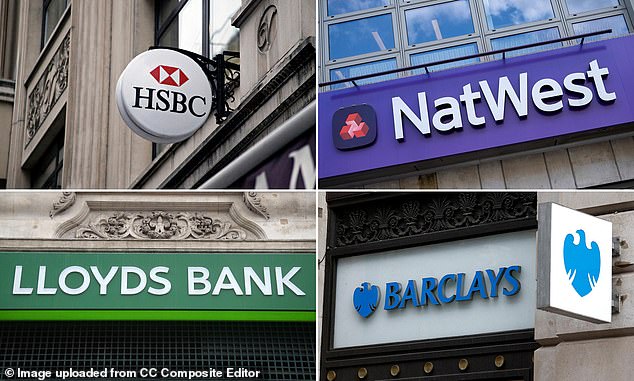[ad_1]
A windfall tax on the profits of Britain’s four biggest banks would boost Treasury coffers by billions of pounds, according to a report from think tank Positive Money.
Taxing the profits of Barclays, NatWest, Lloyds and HSBC could raise more than £11billion for the Treasury, according to analysis by the think tank which campaigns for monetary reform.
It comes as Britain’s four biggest banks posted big profits for the financial year 2024/25 in their half-year results.
The think tank said Britain’s Big Four banks – Barclays, NatWest, Lloyds and HSBC – are on track to make a record £48billion profit in 2025, based on their results for the first half of this year.
Barclays’ saw pre-tax profits rocket 23 per cent to £5.2billion for the six months to 30 June. Meanwhile NatWest reported an 18 per cent rise in its first half profit to £3.6billion.
Lloyds reported its pre-tax profit rose to £3.5billion in the six months to June, while HSBC saw pre-tax profits fall 26 per cent to £11.9billion ($15.8 billion) in the first half of the year.
Collectively, their pre-tax profits for the first six months of this year stand at £24.1billion.
Positive Money proposes a levy of 38 per cent on the estimated full-year net income for the Big Four’s UK retail banking operations – which it forecasts to be £33billion – above a £800million threshold would deliver an £11.3billion boost to the Treasury.

Windfall: Britain’s four biggest banks collectively raked in £24.1bn in pre-tax profits in the first half of 2025
Should we have a windfall tax on banks?
Positive Money’s argument for a windfall tax is that banks are ‘an essential public utility’ like energy, and profits should be recouped accordingly.
Simon Youel, head of policy and advocacy at Positive Money, says: ‘Just as energy companies shouldn’t be able to profiteer, neither should banks – taxing windfalls makes sense for both.’
HSBC, Barclays, Lloyds, and NatWest reported pre-tax profits of £45.6billion for 2024, fuelled by higher interest rates.
This was more than four times the profits recorded in 2020, before interest rates started rising.
‘The government is quietly handing over tens of billions of pounds a year to the Bank of England to cover the costs of higher interest rates, much of which is ending up in the pockets of banks’ shareholders,’ says Youel.
At the same time, the Chancellor is searching for funds to repair Britain’s fraying public finances and there has been speculation that banks’ strong gains could make the industry a tempting target for a tax raid by the Chancellor in her autumn Budget
But the UK’s biggest bank bosses have warned in no uncertain terms that levying bigger taxes on banks would strangle the growth the Government is grappling for.
NatWest boss Paul Thwaite has warned Rachel Reeves against a tax raid on banks, saying: ‘Strong economies need strong banks.’
‘What I want to do is use the bank’s capital to invest in the business but also to support customers. If we do that, that supports the wider UK growth agenda,’ he added
He is joined by Charlie Nunn, chief executive of Lloyds Banking Group, who said increasing taxes on banks ‘wouldn’t be consistent’ with helping them boost the economy.
Most recently Barclays boss CS Venkatakrishnan warned against additional taxes on banks.
He said ‘Growth is the primary objective for the UK and a higher taxation of businesses is not a path towards that growth.’
How would a windfall tax on banks work?
The windfall tax on banks proposed by Positive Money would be in line with the Energy Profits Levy on oil and gas companies.
This windfall tax was introduced by the Government in May 2022 in response to soaring energy company profits following Russia’s invasion of Ukraine. The increase in energy prices sparked by the invasion led to bumper profits for energy companies, prompting to calls for a windfall tax.
It is currently set at 38 per cent on profits and in the financial year 2023/24 the levy raised £3.6billion from oil and gas company profits.
Positive Money says a bank windfall tax would follow in the footsteps of countries like Spain which recoups banking windfalls through a levy of 4.8 per cent of banks’ net interest and commission from domestic retail banking above a threshold of €800million.
If it were to be implemented in the UK, Positive Money says it would raise enough money to scrap the two-child benefit cap, estimated to cost the Government up to £3.5billion annually, and cover the cost of its recent u-turn on welfare.
However, an International Monetary Fund report on the Spanish economy in 2024 found ‘windfall levies do not constitute a growth-friendly consolidation strategy’.
SAVE MONEY, MAKE MONEY

Sipp cashback

Sipp cashback
Up to £2,000 cashback until 31 July

5.44% cash Isa

5.44% cash Isa
Rate boosted for three months, then 4.59%

£20 off motoring

£20 off motoring
This is Money Motoring Club voucher

Investing Isa offer

Investing Isa offer
1% back (max £200) when adding £5,000+

No fees on 30 funds

No fees on 30 funds
Potentially zero-fee investing in an Isa or Sipp
Affiliate links: If you take out a product This is Money may earn a commission. These deals are chosen by our editorial team, as we think they are worth highlighting. This does not affect our editorial independence. Terms and conditions apply on all offers.
[ad_2]
This article was originally published by a www.dailymail.co.uk . Read the Original article here. .

